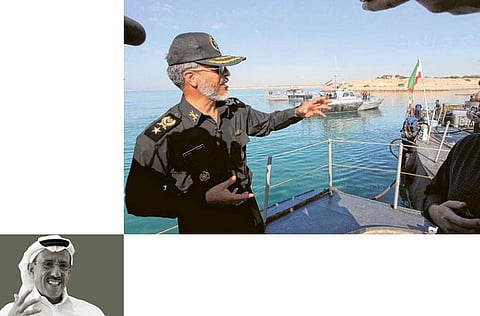Time to react to open Iranian threats
New rules need bold decision-making, innovative lateral thinking and the courage to take pre-emptive steps to thwart the hostile regime

How much longer are Gulf states going to remain in a state of denial? It may be a bitter pill to swallow but we cannot go on pretending that the Islamic Republic of Iran has friendly intentions when it is becoming increasingly hostile to its Arab neighbours. Now is the time for the GCC to shore up its common defence capabilities and engage with its allies to guard the sovereignty and security of its member countries. How much more proof do our leaderships require before they are willing to shed diplomatic niceties and put their cards firmly on the table? We can have no more illusions when the facts are so damning.
As if it wasn't bad enough that Tehran has been inciting the Shiite minority in Bahrain to launch violent anti-government protests, in recent days it has been showing off its military muscle in the Strait of Hormuz and the Gulf of Aden during an exercise ominously dubbed "Velayat" — a Farsi word that means "supremacy". If this isn't a clear message to the world and the region, I don't know what is.
The Commander of the Iranian Navy, Habib Allah Sayyari, has spelled out his country's motive in conducting war games on our doorstep. "Displaying Iran's defensive and deterrent power", "relaying a message of peace and friendship" and showcasing "the county's power to control the region as well as testing new missiles, torpedoes and weapons" were the reasons he gave.
The operative phrase is of course "power to control the region" with peace and friendship ridiculously thrown in for good measure. Someone should inform the commander that friendship cannot be cemented at gunpoint. A number of the missiles test-fired were of advanced short-range. No prizes for guessing which countries they're ultimately destined to hit, certainly not Iran's allies Syria and Iraq or the Caucuses that fall into Russia's sphere of influence — and neither are they meant for nuclear-armed Pakistan.
Threat to close Hormuz
Those missiles have the names of GCC states virtually etched on their casings. Well, if that's how they want to play it, Gulf states should answer by exhibiting their own military hardware and capabilities that are far more sophisticated than Iran's. There's a saying in Arabic: "Show your strength else people might mistake your calm and quiet exterior as weakness".
Some may be tempted to believe that our ally the US will protect us against Iranian aggression; that may be true but it isn't something we can rely upon. When the Trucial States, the forerunner to the UAE, were still under Britain's protection the Shah wasn't deterred from grabbing the islands of Abu Mousa and Greater and Lesser Tunbs. Major world powers don't have friends, only interests. They could sell us out any time which is why with the help of God we must take control of our own destiny. Compounding an already volatile climate was an Iranian threat to close the Strait of Hormuz to shipping in the event Washington imposes sanctions against Iran's oil industry exports. Once again, Sayyari didn't hold back. He said his country has "comprehensive control over the strategic waterway" — the conduit for 15 million barrels of oil daily. Sealing it to vessels would be a "very easy" task for Iranian forces, he somewhat arrogantly believes.
If that warning has substance and isn't just empty rhetoric its manifestation would have a negative effect on GCC economies and send oil prices soaring, shattering global efforts to stabilise currencies and markets.
A spokesman for the Pentagon has responded describing the waterway as an "economic lifeline" and adding that "interference with the transit or passage of vessels through the Strait of Hormuz will not be tolerated". He's wagged his finger at Tehran all right, but what is it that the US proposes to do about it? Washington's spent years finger-wagging over Iran's uranium enrichment programme but that's still ongoing with some experts holding to the belief that Iran is close to building a nuclear bomb.
As for the UAE, its diplomatic links with Iran run hot and cold but the two countries have maintained strong trading relations. That is until now. According to Iranian media, Tehran has banned the extension of letters of credit relating to imports from the UAE and has announced its intention to suspend trade between the two countries. One Iranian politician has warned the UAE "to resist the meaningless pressure imposed by arrogant powers so that they can continue their economic relations with the Islamic State". He's dreaming. Iran is the pariah country suffering economic sanctions, not the UAE, which translated means ‘they need us a whole lot more than we need them'. No wonder subsequent statements out of Tehran sounded conciliatory.
What are we waiting for? I've said for a long time that the UAE must cut diplomatic relations with Tehran and should ban all trade with Iran. Yes, our merchants would incur losses but within a very short period those could be covered by new trading partners. We cannot go on compromising our souls for a fistful of Persian rials. The rules of the game changed while we weren't looking. These new rules need bold decision-making, innovative lateral thinking and the courage to take pre-emptive steps to thwart the ayatollahs from checkmating us all.
Khalaf Al Habtoor is a businessman and chairman of Al Habtoor Group.


